A sailboat racer and a pilot, Robert F. Utter has sailed
the sea and soared the sky, but his voyages of discovery have also taken him to
what he describes as the "sacred sanctuary of the conscience." His life's work is
to be a man of faith and a judicious judge.
On March 30, 1995, after 23 years on the Washington Supreme Court, he told the chief
justice he was resigning. He could have walked across the street, up the steps to
the Capitol and through the marbled halls to Gov. Lowry's office. He could have
called a news conference with a gaggle of reporters and TV cameras. But that didn't
feel right either. This decision was too personal. Instead, he composed a formal
letter, sent it over to the governor, then called the veteran Associated Press correspondent,
John White, who got the scoop because their sons once swam on the same team.
"I have reached the point where I can no longer participate in a legal system that
intentionally takes human life," Utter told the governor. "...We are absolutely
unable to make rational distinctions on who should live and who should die."
In 1971, when he was 41, Utter had become one of the youngest justices in state
history. He dissented in two dozen death penalty cases before concluding he was
tilting at windmills. Killing to satisfy its visceral appetite for retribution,
the system "is fatally flawed," the judge said. "Like lightning," the death penalty
"strikes some but not others in a way that defies rational explanation." Worse yet,
Utter asserts, an allegedly "modern civilized society" has executed at least 48
innocent people in the past four decades. Then there are the close calls: More than
100 people on Death Row across America have been freed in recent years based on
DNA tests and other new evidence.
Utter believes that a life sentence without the possibility of parole protects society
just as well - and at far less expense. In 2007, New Jersey became the first state
to ban executions since the U.S. Supreme Court reinstated the death penalty in 1976.
Utter notes that the governor there commuted the death sentences of 10 men to life
imprisonment without the possibility of parole in the wake of the revelation that
each death sentence cost the state $4.2 million. "It's 10 times more expensive to
kill them than to keep them alive," Donald McCartin, once known as California's
"Hanging Judge of Orange County," told reporters early in 2009. A month later, New
Mexico Gov. Bill Richardson repealed the death penalty in his state, saying, "I
do not have confidence in the criminal justice system as it currently operates to
be the final arbiter when it comes to who lives and who dies for their crime…"
While his stand on the death penalty is the most dramatic chapter in a 55-year legal
career, Utter's jurisprudence is prolific. His longest lasting contributions may
well be in the areas of state constitutional law, environmental law, criminal procedure
and eliminating bias from jury instructions. In 1978, he wrote an opinion that established
a battered woman's right to self defense. He was the lone proponent of the "battered
woman theory" when the debate began behind closed doors, but the eloquence of his
arguments carried the day.
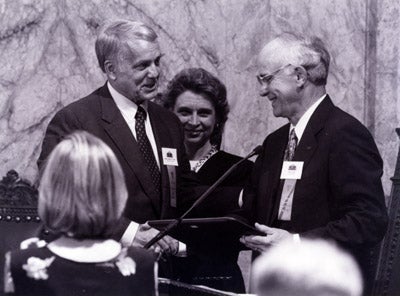 Justice Utter is congratulated by former
governor Dan Evans in 1997 as the YMCA's Youth & Government program announces
it has named its top award in his honor. It is presented annually to "an individual
of unquesti onable integrity who exemplifies outstanding citizenship, leadership
and character." Chris Gregoire, then Attorney General, looks on at center.
Justice Utter is congratulated by former
governor Dan Evans in 1997 as the YMCA's Youth & Government program announces
it has named its top award in his honor. It is presented annually to "an individual
of unquesti onable integrity who exemplifies outstanding citizenship, leadership
and character." Chris Gregoire, then Attorney General, looks on at center.
Utter's advocacy for victims' rights and compensation counters the charge that he
is a bleeding-heart liberal. For 40 years, he has been saying that victims too often
are the forgotten people in the criminal justice system. "Once the immediate reactions
of anger, fear and vengeance have been verbally expressed" in the wake of a crime
"the average citizen washes his hands of all responsibility and leaves it to the
official avengers." The system's "primary client is the victim," the judge told
the Seattle Rotary club in 1972 in a speech that made headlines around the state.
It was one of many such talks he would give in a typical year - at PTA meetings,
Prayer Breakfasts and Bar Association gatherings. Early on, he dedicated himself
to harnessing what he calls "The power of one plus One."
Utter is a tireless mentor. He was a co-founder in 1958 of the Big Brothers chapter
in Seattle, the state's first; helped launch the Thurston-Mason chapter in 1982
and played a key role in the YMCA's Youth & Government program, which in 1997
named its top award in his honor. It is presented annually to "an individual of
unquestionable integrity who exemplifies outstanding citizenship, leadership and
character." (The 2009 winner is Secretary of State Sam Reed.)
Although Utter has won countless awards, you'll find only a couple on his shelves.
He takes his satisfaction from the lives he has saved or changed. From the bench
and on the streets he saw "the countless confused, accused, misused, strung out
ones and worse," as Bob Dylan once wrote, and he felt compelled to intervene.
In the years since he left the court, Utter has been engaged in judicial, civic
and political activism on multiple fronts around the world. He has a national reputation
as a legal scholar and mediator and an international following as a teacher. The
courage of judges in emerging democracies inspires him. Some of his students have
been gunned down or blown to bits in places where theocratic fascists fear an independent
judiciary. One was shot and killed as he drove to work, and an insurgent group boasted
that the murder ''would make God and the Prophet very content.''
Close friends and loved ones have seen what Utter acknowledges is an "undercurrent
of sadness." There have been dark days and long nights when he has struggled with
the heartache of a daughter born with serious physical and emotional challenges.
He is appalled by hate, hunger and injustice and has no easy answer for the never-ending
question of why bad things happen to good people. He agonized over his discovery
that a vulnerable young woman had been sexually victimized by a minister he trusted.
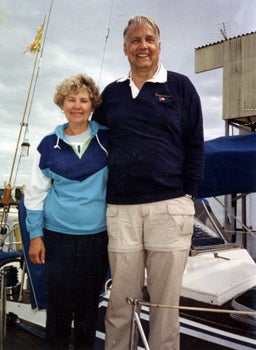 Bob and Betty Uttter on the deck of
their sailboat, Daring Spirit.
Bob and Betty Uttter on the deck of
their sailboat, Daring Spirit.
He has waged a winning battle with cancer and Parkinson's disease. Others have endured
far worse, he emphasizes, adding that pain can be a profound "teaching lesson."
Life is a celebration, the judge believes, "and it should be lived that way, no
matter how much pain is there."
Through it all he has been sustained by his faith and the love of his life, Betty
Utter - teacher, friend, fellow sailor, the woman who never balked when he brought
home stray kids who needed a hot meal and the intervention of a caring grownup.
Betty is a remarkable person in her own right. She was a highly regarded teacher,
taught counseling at Saint Martin’s College and served as president of the Associated
Ministries of Thurston County. In the 1970s, she helped launch an ecumenical religious
education program for the mentally handicapped. It grew to embrace about a dozen
churches in Thurston County. When they lived in Seattle, Friends of Youth, a church-sponsored
shelter for teen-age boys, was one of Bob and Betty’s early causes. In their retirement
years, the Utters have been working with the Rural Development Institute, which
promotes social justice by helping poor people around the world secure land rights.
Betty also has volunteered as a mediator with the Dispute Resolution Center of Thurston
County.
Betty says Bob was "tall, dark and handsome" when they first met on campus at Linfield
College in Oregon in 1949. He's gray now and quips that with age he has also become
"less tall" - but she's "still short." He's a striking man, with vivid blue eyes,
a gentlemanly demeanor and a puckish sense of humor. Especially in the days when
he puffed a pipe, he looked just like the judge you'd get if you called Central
Casting.
He is soft-spoken, sometimes hesitating in mid-sentence to choose just the right
words. His smile is so engaging, his manner so unpretentious that you'd never guess
he is fundamentally shy. You'd never imagine that in high school he was an underachiever
with no real notion of what he'd like to be when he grew up. Well, he knew one thing
for certain: Despite his father's prodding, he didn't want to join him selling life
insurance.
Early heartbreak
Robert French Utter was born in Seattle on June 19, 1930. A few months before his
sixth birthday, his mother died in childbirth, together with the infant son she
was carrying. Besse Utter was 28 years old when she bled to death on April 7, 1936.
It was a devastating blow to her husband and the two young sons she left behind.
In 1937, John Utter remarried. Bob's stepmother was a religious education director.
Despite her strong faith, acquiring two young sons was as difficult for Elizabeth
Utter as it was for Bob and his younger brother, Fred. She wasn't a bad person,
Bob emphasizes, but she could never replace the mother he had lost. Happily, in
her last years, they reconciled completely. But when a first grader loses his mother,
he carries some of that heartbreak and insecurity for the rest of his life. In grade
school especially, Bob felt like a "wounded bird."
Baptized at the age of 12, Bob was a somewhat reluctant churchgoer as a teenager.
He knew his Bible, but the sermons weren't that stimulating. He was already bored
and bemused by tedious doctrinal dustups - "sprinkling vs. dunking," for instance,
as he puts it wryly. He found literature, history and politics a lot more interesting.
The highlight of his teenage years came in 1948, when as a senior at West Seattle
High School he participated in the second annual Youth Legislature in Olympia. "It
was the revelation that a whole new world existed. I found out how government was
supposed to work." During his career on the bench, Utter served as president of
the Youth & Government Board for 13 years.
In 1948, he was off to Linfield, the Baptist school at McMinnville. After two years,
he opted to transfer back home to the University of Washington, where he majored
in English Literature and Political Science. During his junior year, he also weighed
the idea of becoming a minister, but "didn't feel that strong of a calling." In
that era, a promising student could gain "early entry" to the UW Law School without
a four-year degree. That intrigued him. Supreme Court Judge Matthew Hill was a member
of the Seattle First Baptist Church and Utter concluded that a law degree would
be a good fit for a career in public service. The Korean War temporarily changed
his plans. Utter enlisted in the Air Force the summer before he began law school,
hoping to become a fighter pilot. A bum shoulder ended that idea and put him back
on campus. (Some 30 years later, he got his pilot's license and went on to earn
instrument ratings. Flying turned out to be fun, but less spiritual than sailing,
although Utter figured he must be on the right side of the Lord when he safely made
a wheels-up landing on the rain-slickened main runway at the Olympia Airport in
his Cessna 210.)
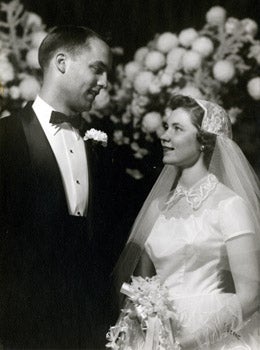 The Utters on their wedding day, December
28, 1953.
The Utters on their wedding day, December
28, 1953.
Betty Stevenson, a petite girl who was as bright as she was pretty, had also returned
home to Seattle and the UW to pursue her teaching degree. They had dated during
his sophomore year at Linfield. This time they fell in love and were married on
Dec. 28, 1953. "We bought a sailboat before we bought a house," Bob notes. "We had
our priorities straight."
Graduating from law school in 1954, Utter jumped at the chance to become Judge Hill's
law clerk at the Temple of Justice in Olympia. Matthew Hill, then 60, was once described
by an admiring press as "a tireless worker in civic, church and charitable affairs,
and a public speaker of wide repute." The last part was particularly true. Hill
loved to give speeches on every imaginable topic, from politics to parables. Earlier
in his career, the Republican had sought election to the State Legislature and Congress,
losing to future Washington State Democratic icon Warren G. Magnuson in 1938. Being
a judge was Hill's real calling. Fatherly and wise, he saw to it that his law clerks
- especially good Baptist boys like Bob Utter and Charlie Smith, another future
judge - got a wide-ranging education not only in jurisprudence, but in morals and
manners. Being Judge Hill's law clerk was a lot like being an admiral's aide-decamp.
You stayed up late, got up early, made sure your i's were always dotted and also
did the driving. It was a great year.
After 18 months as a deputy with the office of "Mr. Republican," King County Prosecutor
Charles O. Carroll, Utter joined a Seattle law firm in 1956. The job offered a lot
better pay and the learning experience of dealing with a broad base of clients.
His spare time was devoted to helping young people, church activities and starting
a family of his own with Betty. Then their first of three children, Kim, was born
with multiple handicaps, including the inability to cry until a surgical procedure
was done. The young couple was under enormous stress, emotionally and financially.
A phone call put them at a life-changing crossroads. It was a King County Superior
Court judge who had been impressed with 29-year-old Bob Utter's intelligence and
poise in his courtroom. Would Bob like to become a Superior Court commissioner assigned
to Juvenile Court? Utter didn't even know where the Juvenile Court was, much less
a lot about the laws governing juvenile delinquency. What he did know was that he
cared about kids and felt a calling to make a difference. Lawyers, after all, are
supposed to help people. Still, the job paid half as much as he was making with
the law firm. Would that be fair to his family? Their daughter clearly would need
ongoing medical attention.
"Take all the time you want to decide," the judge joked, "but we have to know tomorrow."
He and Betty talked about it, prayed about it. They decided it could be the chance
of a lifetime - or maybe a disaster. But they were young, imbued with faith and
concluded that if he didn't give it a try they would always wonder what might have
been. "So within 24 hours the course of my life was dramatically changed," Utter
recalls. And for the better, too, as it quickly turned out, because he immediately
encountered a boy who needed a stand-up man in his life.
Into his court one day in 1959 came Charles Russell, a fatherless 15-year-old who
had shot his mother's boyfriend to stop him from beating her. "Over the years, I've
always told Charlie the only mistake he ever made was just shooting him in the foot,"
the judge quips. "I could tell that he was a kid with a world of potential. We found
a spot for him at the Jessie Dyslin Boys Ranch. I had good friends with deeper pockets
who were interested in helping me help troubled kids."
"Until I met Bob Utter, I had no future," says Russell, now 66. "I couldn't really
read or write and I was getting into a lot of trouble. I had third- or fourth-grade
reading skills. By intervening in my life, he gave me a series of chances, and that's
important because one chance doesn't always work, especially with kids. For me,
there was no one thing that turned my life around. It was a cascade of events and
a series of chances… The Boys Ranch was important, but it was Bob who was always
there. I was slightly dyslexic, but I could do chemistry and math and he encouraged
me. I didn't have anybody else to call."
At Washington State University, Russell earned degrees in biochemistry, zoology
and entomology. ("That's bugs," he explains.) Then he earned a Ph.D. in ecology.
"I've never gone where I thought I was going to go," he says. "I taught at the University
of Costa Rica and eventually worked on a road through the mountains of Peru, then
on a dam project in El Salvador. I went from crops to forestry to infrastructure
projects." Russell now owns a tour company - Let's Tour Seattle - working with cruise
ships and museums. He and Utter talk often. "I'm constantly amazed at his level
of morality - his true belief in people who I would have given up on a long time
ago. Sometimes I shake my head at his - I can't call it naiveté. It's just faith."
The tears well up in Utter's eyes when he recalls all the Charlies he has met. His
only regret is that he couldn't help them all. Betty has always shared Bob's commitment
to helping children. But there were times, she admits, when Bob's cheerful line,
"Guess who's coming to dinner?" prompted a sigh.
"And who is my neighbor?"
As he became a juvenile court commissioner, judge, Big Brother and active Christian
layperson, Utter grew increasingly frustrated with theological silo building. He
wishes more people would cut to the chase and just read and heed Christ's words.
The Parable of the Good Samaritan early on became his North Star. In Luke, Chapter
10 verses 25-37, we encounter a lawyer who decides to see if Jesus is fast on his
feet:
"Teacher," he asked, "what must I do to inherit eternal life?"
"What is written in the Law?" Jesus replied. "How do you read it?"
The lawyer answered: " 'Love the Lord your God with all your heart and with all
your soul and with all your strength and with all your mind. And, 'Love your neighbor
as yourself.' "
"Exactly," Jesus replied. "Do this and you will live."
But the lawyer probed for a definition: "And who is my 'neighbor'?"
Jesus told the story of a man who was set upon by robbers while traveling from Jerusalem
to Jericho. They beat him, took his clothes and left him half dead and naked alongside
the road. A priest happened by, but when he saw the hapless victim, he moved to
the other side of the road. Shortly thereafter, a Levite did likewise. At last,
a Samaritan took pity on the victim, bandaging and salving his wounds. Then he put
the man on his own donkey, took him to an inn and made him as comfortable as possible.
The next morning, he gave the innkeeper two silver coins. "Look after him," the
Samaritan said, "and when I return I will reimburse you for any extra expenses you
may have incurred."
"So," Jesus asked the lawyer, "which of these three do you think was a neighbor
to the man who fell into the hands of robbers?"
"The one who had mercy on him," said the lawyer.
"Go and do likewise," Jesus advised.
I simply have to face a world where I know unjust things occur. I know that God is love, and I rebel against the injustice I see in this world.
Utter fervently believes that Jesus is emphasizing that compassion should be for
all people, and that fulfilling the spirit of the law is just as important as fulfilling
the letter of the law. Moreover, your "neighbor" isn't just the guy next door; it's
everyone in the family of man.
Juvenile Court was "a real eye-opener" for Utter, who had "no realization of the
extent of deprivation children faced in our society." It was bad then, and it's
dramatically worse today, the judge says. "I probably heard at least 3,000 cases
each year, and I came to growing realization that love is the absolute cornerstone
of the meaning of family life. Parents can provide everything from material and
educational standpoints, but if children have not experienced love and an appreciation
of their self-worth, they have nothing to build on." More importantly, he came to
see that when children get into trouble society writes them off at its peril. Given
the right intervention, a second chance, even a third chance, problem kids can become
responsible adults with children of their own who won't be neglected. Neglect begets
neglect, Utter emphasizes.
"I have seen things which I don't understand and which have torn my heart apart.
Children who are abused sexually and physically, who are involved in drugs and prostitution.
These would leave anybody questioning who sees this time and time again. I simply
have to face a world where I know unjust things occur. I know that God is love,
and I rebel against the injustice I see in this world.
"The most difficult thing for me during those years in Juvenile Court was to see
marvelous human beings who I knew could make it if they had just a little more help
from others - a few hours of a person's day, the impetus for a little more education.
I can only say, 'God, I'll do a little bit. I'll do as much as I can and then leave
it to You to provide the answers.' "
At the next level, there were even more terrible questions and elusive answers.
"To Die Is Not Enough"
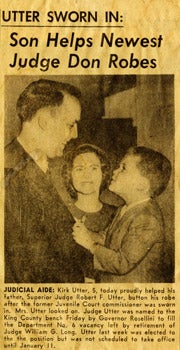 Robert F. Utter's scrapbook.
Robert F. Utter's scrapbook.
After five years as a Juvenile Court commissioner, 34-year-old Robert Utter had
developed a reputation as a bright and thoughtful judge and civic activist. Besides
his work with Big Brothers, in 1964 he was the co-founder and president of Job Therapy
Inc., a nationally recognized vocational and mentoring program for convicts and
those on parole. Also active in the YMCA and PTA, he was a deacon in the Seattle
First Baptist Church. The Jaycees named him "Seattle's Most Outstanding Young Man"
in 1964. Judges, law enforcement officers and other admirers urged him to run for
the King County Superior Court bench. There were two other candidates, but Utter
campaigned tirelessly, striving for "a knockout punch" in the primary. He had given
more than 200 talks to PTAs and other groups in the past year, and it paid off.
He took fully 60 percent of the vote.
Shortly after his re-election, without opposition, in 1968 Judge Utter met a murderer
who changed his life and whose life he would change. To understand why Robert Utter
feels so passionately that the death penalty is just plain wrong you need to know
about Don Anthony White.
Don Anthony White was a 22-year-old black man who'd been in and out of reform school,
mental institutions and jail. On Christmas Eve, 1959, he stabbed to death a black
longshoreman when they quarreled while drinking. White got the "weird shakes" and
"just went into a mad rage." Afterward, he said he "went wandering" and found himself
in the laundry room of a housing project where as a child he used to take refuge
for hours in the clothes dryers. ("It seemed like nothing could get to me in there.")
As he started to leave, a gray-haired woman "banged the door by the dryers." In
a flash, he crumpled her with a savage blow. Then he raped her and left her dying.
In truth, he'd attacked the woman first and the man some 15 hours later. Clearly
in one of his "fogs," White confessed to the killings without benefit of legal counsel.
He told his parole officer, "I should've been in the bughouse a long time ago. …
I get wound up and reach a point where something has to happen …something violent…
bam!" He slammed the table with his fist. "If I get a lawyer and he tries to get
this reduced from 'murder first' to 'murder second' I'm not going to let him. It
probably would be better if I did drop off the end of that rope."
White had been raised from infancy by an emotionally disturbed foster mother. She
told bizarre, rambling stories about how she had acquired the child on a visit to
Kansas. Her ex-husband testified that when she was angry with Don she would tell
him he'd been thrown in the garbage and "nobody didn't want him." Sometimes "when
she would get mad, she would hold his head down between her legs" and whip him with
the cord to the iron. Don was often so enraged over the whippings and other abuse
that his foster sister thought he "could've murdered her or something. His eyes
would get real funny lookin' …bright red … like a person who was outta their mind."
Don attempted suicide at the age of 5. "That damned garbage can" was seared into
his brain. "Oh, God, that used to bug me!" he told a court-appointed psychiatrist.
A perpetual truant and runaway since the age of 7, Don Anthony White was extraordinarily
bright, which other children resented. He told counselors that he had endured non-stop
racism at school and the children's mental health center, where he was the only
black child. He fled the classroom one day, sobbing that he hated being called "nigger."
At home, he'd go into a psychotic, trancelike state and "get the awfullest headaches,"
his foster mother said. Then he'd break the furniture and threaten to burn the house
down. In 1951, the 14-year-old was diagnosed with childhood schizophrenia that was
rapidly progressing into the psychotic symptoms seen in adult sufferers. At the
rate he was descending into madness, they said he was bound to seriously injure
or kill someone. When they first sat side by side, one of his court-appointed attorneys
said he was afraid his client might kill him. White soon realized, however, that
someone actually genuinely cared about him. They were trying to save his life.
The attorneys worked tirelessly to demonstrate that he should be committed to an
institution for the criminally insane, but on May 27, 1960, an all-white jury found
him guilty of the murders and recommended that he be put to death.
The next eight years were punctuated with despair, resignation and hope. White's
attorneys never gave up. In the King County Jail, then on Death Row at Walla Walla,
Don's other frequent visitors included Quakers, nuns and priests - even the Roman
Catholic bishop of Spokane. A librarian saw to it that he received books "to challenge
his capable mind." Investigative reporters took up the cause of mentally ill inmates.
Among them was Donald Delano Wright, who wrote a prize-winning series on the death
penalty for The Seattle Times.
By 1963, the murderer had made remarkable progress. He stunned the judge who was
about to sign his death warrant by thanking him for his courtesy. White said his
two lawyers "were the greatest" and praised the prosecutor, who was "a gentleman
all the way." White said: "I abhor the nature of the crime that I am here for, yet
I hope that other people who commit similar crimes will benefit from it somehow,
that the death penalty will pass from our scene and that we will all understand
a crime of this nature a little bit better." The judge was stunned at the transformation.
He called it "a magnificent thing - one of the finest statements I have ever heard
in open court."
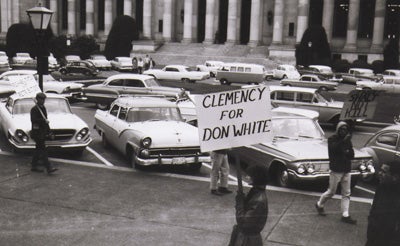 Death penalty opponents picket at the steps of the Capitol, urging Governor Al Rosellini to grant Don Anthony White clemency.
Death penalty opponents picket at the steps of the Capitol, urging Governor Al Rosellini to grant Don Anthony White clemency.
Don Anthony White found himself, God and, in time, a full measure of sanity. The
state still wanted him dead. On the eve of Palm Sunday, 1964, with White's date
with the gallows just days away, Joan Baez, the famous folk singer, and a dozen
pickets staged an all-night vigil in front of the Capitol at Olympia. Inside, Gov.
Al Rosellini was mulling a swarm of pleas for clemency. He invited Baez and some
of the other death penalty protesters into his office. Rosellini's Republican opponent
in his upcoming bid for re-election, State Rep. Dan Evans of Seattle, believed the
death penalty was "barbaric" and had "not proven to be a deterrent to crime." Finally,
Gov. Rosellini granted a 30-day stay of execution.
The appeals and petitions dragged on. Evans went on to defeat Rosellini and fought
a relentless but losing battle against capital punishment during his unprecedented
three terms as governor.
Months became years. The State Supreme Court repeatedly turned a deaf ear. Undeterred,
White's lawyers kept advancing the key issue that he had been interrogated by police
without benefit of counsel at a time when he was emotionally defenseless.
Then, on Good Friday, 1966, Don Anthony White's conviction was overturned by a federal
judge in Boise. Resolute, prosecutors filed an appeal with the U.S. 9th Circuit
Court in San Francisco. In 1967, the appellate court granted White a new trial in
King County Superior Court. The judge was to be Robert F. Utter, whose work with
young offenders and strong commitment to rehabilitation seemed heaven sent for Don
Anthony White. The young judge also treated all before him with courtesy.
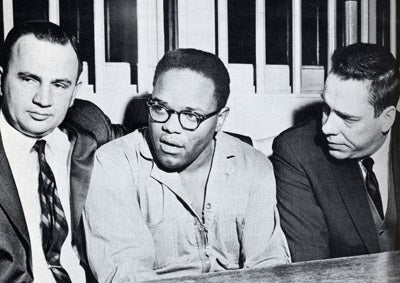 Don Anthony White, flanked by his lawyers,
James C. Young, left, and David A. Weyer in 1963.
Don Anthony White, flanked by his lawyers,
James C. Young, left, and David A. Weyer in 1963.
Courtesy Seattle Post-Intelligencer.
Hopes sagged at the defense table when Utter promptly sided with the prosecution,
ruling that White's confession and the tapes of his interrogations could be admitted
into evidence. "A new trial is not a new case," the judge said. Crucially, however,
Utter would not let the jury see an inflammatory morgue photo of the woman White
had killed. Her scalp had been shaved for the autopsy, and the first jury had been
horrified by the image. Utter also allowed a defense psychiatrist to testify that
White was out of his mind when he committed the murders. The rape, the psychiatrist
added, was not of a brutal nature and "may actually have represented some kind of
a primitive, infantile attempt to have a sexual relationship with a mother-person…"
The defendant told the jury he was not yet fully safe to be at large - but what
good would killing him do when he might yet do some good himself? White was making
certain that his own attorneys could not fashion a defense based on the assertion
that he was insane in 1959 but now should be set free. Further, during his first
trial, a psychiatrist testified that the killer was irreversibly psychotic. In the
second trial, Utter notes, White showed no signs of psychosis, "one more example
of our inability to judge with finality that there is no hope of changing a person."
In the summer of 1968, the King County jury found White guilty of both murders,
but rejected the death penalty. The next day, Judge Utter asked White if he had
anything to say. He did: "Martin Luther King said that there is a mountaintop. I
have been clawing to get there for a long time, and I won't stop now…"
The prosecution urged Utter to recommend to the State Parole Board that White's
minimum term be set at life, without possibility of parole. "The judge flatly refused
to interfere with the Parole Board's discretion," Donald Delano Wright wrote in
his riveting book about the case, To Die Is Not Enough.
"The transformation in Don Anthony White over the course of those eight years was
truly remarkable," Judge Utter wrote. "He had graduated from high school and Walla
Walla Community College in prison, studied architecture and drafting through correspondence
courses and became an accomplished painter, able to portray with brushes and canvas
many of the conflicts that tormented his soul."
White's brother, Karl, an outreach ministries pastor in Georgia, says that "with
the discovery that people actually cared about him as a person, he finally really
started coming out of the psychosis and finding himself."
With time off for good behavior and the support of Gov. Evans, Don Anthony White,
Inmate No. 117121, was sent to a work-release program at Western State Hospital
in Steilacoom in 1976. The rest of this story, unfortunately, lacks an entirely
happy ending.
White began working for the Tacoma Urban League and was a popular employee. In 1979,
however, some of the old demons returned. Don was in "emotional turmoil" when he
was subpoenaed as a defense witness in a death penalty case. Asked to describe what
it was like to live in the shadow of death, he told of hearing the trapdoor spring
open as his nextdoor neighbor on Death Row was hanged. To relive those moments "was
a very harrowing experience for someone who was locked up for so long," an Urban
League social services director told reporters.
Don failed to return to the halfway house and was reported to police as AWOL the
next morning. "Everybody - his sponsor, his fiancée, all the people who are supportive
of him, are all just shocked," the state work-release supervisor said.
White told his brother he had to get away and took off on what he called "a month-long
vacation" across the country. Then he turned himself in and was sentenced to five
more years in prison for escape. He ended up at the correctional center at Vacaville,
Calif., where he helped with the orientation of new correctional officers and prisoners.
Don did his last two years back in Washington State. Paroled again in 1987, he left
Tacoma to become director of the Abolition of the Death Penalty Project for the
American Friends Service Committee in Oakland, Calif. He appeared on the Oprah Winfrey
show and spoke frequently before church and civic organizations. He often appeared
as a witness in death penalty cases. That part was still the hardest. Being in court
"always brought back a lot of memories from his trial," his brother recalls. "He
used to tell me, 'I'm alive, well and enduring.' "
...at no point in the life of a human being are we wise enough to say a person is beyond redemption.
There was more to endure. He was badly injured by a mugger in Oakland in 1991. Decades
of chain-smoking, stress and diabetes also took their toll. Don Anthony White died
in Oakland on Feb. 23, 1995, after suffering several strokes, but the Rev. White
says his brother had happily married and was a productive, loving person. He and
Justice Utter say that Don's life story stands as one of the most compelling cautionary
tales against capital punishment. "It makes no sense," Don Anthony White told reporters
not long before his death. "It doesn't bring anybody back."
"Judge Utter, in the words of one of Don's attorneys, 'permitted introduction of
evidence covering the broadest spectrum of rehabilitation,' " Karl White recalls
today. "He took a stand for equal justice. For a young judge to go up against the
system was really impressive, not even considering the racial climate at the time."
Utter's actions "caused me to do a lot in the ministry, especially with young African-Americans
and Latinos … working with youth at risk. His conclusion that the death penalty
is not fair, not a deterrent and, in his words, an 'unjust law,' " amounts to an
indictment of a prison system "that merely warehouses people and does not rehabilitate,"
Pastor White has written.
The moral of the Don Anthony White story is that "at no point in the life of a human
being are we wise enough to say a person is beyond redemption," Utter believes,
adding that a life sentence without the possibility of parole protects society just
as well.
A new appeal
In 1968, Gov. Evans, impressed by Judge Utter's track record on and off the bench,
named him to the newly-authorized Washington Court of Appeals. Utter ran unopposed
for a full six-year term the following year.
Utter kept pushing for prison reform and community-based counseling and detention
facilities that could serve as workrelease centers. "The failure to provide realistic,
post-institutional support for men until they can be reintegrated back into the
community would seem to practically guarantee they must return to crime to provide
the basic necessities of food, clothing and shelter," he wrote during that era.
He was still active in Job Therapy Inc. and also outspoken on victims' rights. "Dangerous
offenders must be removed from the streets," he told the Young Lawyers group in
King County, also emphasizing that 85 percent of the men in prison are not dangerous
offenders. If society thought it was making things better by warehousing men in
lonely institutions, with little opportunity for substance abuse counseling, education
or vocational training, Utter said it was a false sense of security. "We have to
realize that we are dealing not only with ideals, but with human beings." The judge
is an admirer of former governor Booth Gardner, who shares his commitment to helping
disadvantaged youth. "Booth put it so well when he always reminded the taxpayers
that when it came to investing in programs to help kids, 'You can pay me now or
you can pay me later, and later is going to be a lot more expensive in more ways
than one.' "
"Our current penal system is an offense-oriented system, not an offender-oriented
system, and the maximum sentence is based on the offense committed rather than on
the capacity of the offender for change," Judge Utter said in a 1970 speech. He
urged the Legislature to establish a "dangerous offender category" in the criminal
code to deal with the 15 percent who definitely "must be separated from society
for safety reasons."
Kindred souls
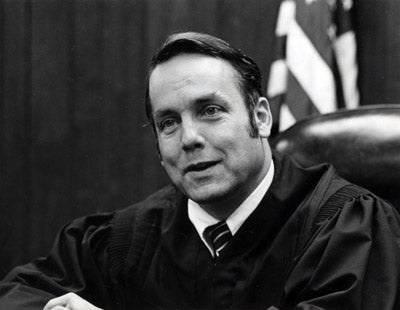 Justice Utter on the Washington Supreme
Court, 1972.
Justice Utter on the Washington Supreme
Court, 1972.
In December of 1971, Justice Morell E. Sharp, who'd been on and off the State Supreme
Court for a topsy-turvy total of 13 months, resigned to accept a Nixon appointment
to the Federal District Court. Gov. Evans didn't need to sleep on that opportunity.
His pick was Robert F. Utter, a judge after his own heart. Evans and Utter were
classic progressive reformers in the Teddy Roosevelt mold. The former Eagle Scout
and the liberal Baptist both opposed the death penalty, cared deeply about the environment
and social services and strongly advocated youth programs.
Utter took the oath on Dec. 20, 1971. He was 41, having made the leap from Juvenile
Court to the state's court of last resort in 12 years.
He has been so closely identified with his opposition to the death penalty that
his diverse body of jurisprudence is often overlooked. He has defended free speech
and religious liberty and ruled curfew ordinances unconstitutional. Utter was also
a vigorous proponent of forcing the state to fulfill its "paramount duty" to fund
basic education. The "special levy roulette" system of the 1970s improperly forced
the school districts to rely heavily on local funding for basic programs, Utter
maintained. "As such, it violates the constitutional requirement that the state
itself make ample provision for the school system. This is not to say that special
levies cannot be used, but only that it is impermissible that they be relied upon
to meet the minimum needs of the schools." Narrowly rebuffed in 1974, his side regrouped
to a 6-3 victory in 1978. "The Constitution meant what it said," Utter emphasizes.
Other key cases during his 23 years on the high court included carrying the day
in a split decision that struck down a "tort reform" law that would have capped
the recovery of general damages in personal injury cases. In 1983 and 1984, he waded
into one of the state's most celebrated snafus, the collapse of the Washington Public
Power Supply System's nuclear power plant projects. WPPSS - pronounced "Whoops!"
by irate ratepayers - also left thousands of bondholders in the lurch. They found
no relief from the high court majority. Utter begged to differ, arguing that the
cases couldn't be resolved without a trial to weigh the unresolved questions of
fact. "The parties should win or lose in the courtroom," he wrote. "It doesn't matter
what the public pressures are." He told the State Trial Lawyers' bulletin that those
two dissents "tell as much about my judicial philosophy as any case."
Utter was developing a national reputation as a scholarly judge. But it wasn't all
smooth sailing.
"The Power of the Holy"
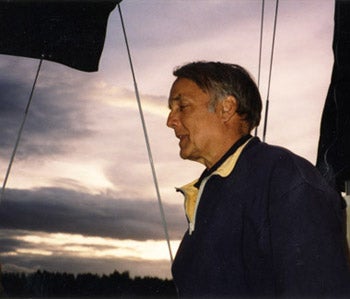 Utter finds solace at sea.
Utter finds solace at sea.
Another of the epiphanies in Utter's life occurred in 1976 during the 2,500-mile
Victoria-to-Maui sailboat race, his first event as a skipper on the open ocean.
"I was not quite certain what I would find," he wrote later, "and suspected that
Columbus's crew was correct that the world was indeed flat, with a great waterfall
at the end over which all intrepid mariners would fall."
The legendary mountain climber Willi Unsoeld, a good friend and neighbor on Cooper
Point in Olympia, often told the Utters that he had experienced many more spiritual
moments "among the bare austerities of God's high places" than in churches, chapels
and synagogues. Unsoeld, who had a doctorate in theology and philosophy, believed
that our fear of "The Power of the Holy" is actually the beginning of wisdom. "Willi
found evidence of that power in the unscaled mountains of this world and described
it as the type of power that convinced us we were no longer in charge of our destiny,"
Utter recalls. Pointing to his bad knees, the judge jokes, "even the small bit of
climbing I did convinced me that there had to be other ways to find the presence
of God that were not quite as terrifying" as the North Face of Mount Everest. "Little
did I know that my love of sailing would lead to similar experiences."
When the 41-foot Nerita sailed out the Straits of Juan de Fuca, the novice skipper
took a fleeting glance at the last land he'd see for days, surveyed the largely
green crew of seven he was now responsible for and realized that "there are no large
boats on the ocean." Utter was at the helm "one stormy morning, just as dawn broke,
steering down towering seas with the spinnaker set, catapulting down the face of
one wave after another." The judge began to sing at the top of his lungs Sunday
School hymns he thought he had long since forgotten. One was the rousing old gospel
tune, "There is a Wideness in God's Mercy":
There's a wideness in God's mercy,
Like the wideness of the sea;
There's a kindness in His justice,
Which is more than liberty.
There is no place where earth's sorrows
Are more felt than up in heaven;
There is no place where earth's failings
Have such kindly judgment given.
For the love of God is broader
Than the measure of our mind;
And the heart of the Eternal
Is most wonderfully kind.
"There is a Wideness in God's Mercy" contains several messages, Utter realized -
the admonition to be kind, the promise of reconciliation and the reminder that our
sins are as painful to God as they are to us. "Later experiences in dealing with
children and adults in court convinced me that the overwhelming Power of the Holy
is found not only in nature but in the lives of his creation and that we can never
be certain of what the effect of that power will be unless we give it an opportunity
to manifest itself," Utter wrote.
"The Power of the Holy" came into even sharper focus for the judge in the 1980s
when he met James M. Houston, the Oxford don who was a revered professor at Regent
College, the international graduate school of Christian Studies in Vancouver, B.C.
Houston's essay on "Living in a Suffering World," touched Utter's heart and soul.
"The book of Job teaches that to live in a meaningful world one needs to cultivate
proper attitudes rather than depend upon simple answers," Houston wrote. "Relating
to God is more profound than knowing about God."
For the record, Utter and his crew didn't win that race, but they were a commendable
third in their class, and the judge won a prize more coveted than any silver cup:
A new sense of self-confidence and the realization that God works in mysterious
ways.
In Utter's second race, the sailboat skippered by his partner, Carter Kerr, was
first in its class and second overall. "It was spectacular!" Utter recalls, sipping
hot chocolate in the cabin of his latest sailboat on a sparkling March day, with
the snowcapped Olympics as a backdrop for Budd Inlet.
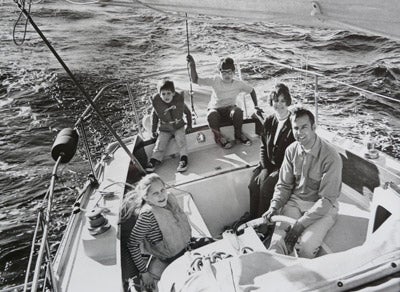 The Utters on the Tacita in the late
1960s. The kids are, from left, Kim, John and Kirk.
The Utters on the Tacita in the late
1960s. The kids are, from left, Kim, John and Kirk.
Sailing has been a family affair for the Utters from the time their children were
in diapers. Kim was born in 1957; Kirk in 1959 and John in 1965. Kirk, in particular,
shares his father's fascination with the sea and is rated among the top 10 sailboat
crew members in the Pacific Northwest. In the 7th grade, his mother also proudly
notes, he had a key role in Seattle Opera's production of "Peter Pan," soaring above
the stage on guy-wires. Kirk Utter graduated from the University of Puget Sound
and now works in the satellite communication industry. His brother John, a Whitman
College graduate, is a fine guitarist, composer and singer. He had a pop music band
called Bounce the Ocean. John has done Web design for the state, including a site
to boost the skills of women returning to the workforce. Kim Utter is also wonderfully
musical, a pianist and singer. Lately, her recitals feature some Bach, and she enjoys
the singing in the Gloria Dei choir. She loves her new electronic piano. Sometimes
on the sailboat, they'd all sing old sea chanteys. Bob has studied guitar "without
much success," but he loves music and is a fan of Andres Segovia, Eric Clapton and
Robert Johnson, the legendary Delta Blues guitarist who claimed he sold his soul
"at the crossroads" to be able to play like the Devil.
Bob and Betty Utter now dote on four grandchildren.
The defining moment
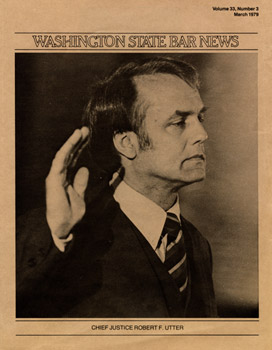 Utter takes the oath as chief justice
in 1979.
Utter takes the oath as chief justice
in 1979.
Utter served as chief justice of the Supreme Court from 1979 to 1981, a time when
Washington State's new death penalty legislation was tested in both the high court
and the federal courts. Utter was also tested at the ballot box. The Kitsap County
prosecutor, Dan Clem, was an energetic challenger in 1980. Clem asserted that Utter
would go off "on a state constitutional law binge" whenever he disliked what the
U.S. Supreme Court was up to.
Utter won re-election in a landslide, and concluded with satisfaction that while
the voters might not agree with him, they respected his integrity and independence.
His platform, in fact, had always been "that if I think you are right, and no one
else agrees with you, you can be certain I will still vote for you."
From 1981 to his resignation in 1995, Utter and his colleagues heard 25 cases where
the death penalty was imposed by a lower court. The Supreme Court upheld the death
penalty in all 25, with Utter dissenting 24 times. He emphasized repeatedly that
"the fatal flaw" was the lack of proportionality. In 1984, he noted in dissent that
one of the defendants in Seattle's "Wah Mee Massacre" of 13 people faced the death
penalty while his two accomplices did not. "The Washington capital punishment scheme
is applied arbitrarily, without pattern or meaningful standards, and therefore violates
the equal protection clause of the 14th Amendment to the United States Constitution,"
Utter wrote.
The one case in which he concurred was the last he heard as a member of the court,
and the majority adopted his opinion, which set aside the death penalty on procedural
grounds.
"Although the action of the federal courts in overturning our cases was encouraging,
I began to question whether I could continue to function in a legal system that
imposed the death penalty." In 1993, his doubts became even stronger after the state
carried out its first execution in 25 years.
The defining moment in his decision to resign from the Supreme Court came in the
fall of 1994 when he read Hitler's Justice: The Courts of the Third Reich,
by Ingo Müller, a German lawyer and law professor. A best-seller in Germany, the
book details the perversion of justice under Nazism. Winston Churchill once described
Hitler as "a maniac of ferocious genius, the repository and expression of the most
virulent hatreds that have ever corroded the human breast. …" All that was played
out in the Nazi courts, as ancient anti-Semitic hatreds and "Aryan" mumbo-jumbo
made a murderous mockery of the rule of law.
Utter read the book practically in one sitting. Then he couldn't sleep. "Müller
chronicles how the entire legal system, including judges, lawyers and lawmakers,
was co-opted to serve a lawless regime with the corresponding death of the rule
of law and its legal institutions," Utter wrote in Unjust Laws, a widely read 1997
essay in the Cardozo Law Review. German justices, lawyers and law school professors
"overwhelmingly openly acquiesced" to Hitler's seizure of power in 1933, "then enthusiastically
collaborated in the worst excesses" of a regime that ignited a global war and summarily
shipped millions of Jews, together with Gypsies, Jehovah's Witnesses, gays, annoying
Lutherans and assorted other "enemies of the Reich," to concentration camps where
the ovens glowed 24/7. Meantime, the "mentally deficient" were liquidated to protect
and enhance the Reich's precious gene-pool while judges looked the other way.
"What was particularly striking," Utter wrote, was Müller's "short chapter on 'Resistance
from the Bench' - short because there was little resistance. In fact, he told of
only two non-Jewish judges who actively protested the actions of the Nazi government
by resigning."
Worn down by dissents that went unheeded, "I could see myself, my own views, becoming
less vigorous," Utter said. "I became concerned that if I stayed in the system …
that this would happen to me."
The judge who had always strived to disagree without being disagreeable took pains
to emphasize he wasn't suggesting that America as a nation or his colleagues on
the court were on the slippery slope to fascism. However, he said he believed too
many people in places high and low were turning a deaf ear to the injustice of Death
Row amid the cry to "get tough on crime."
His resignation was effective April 24, 1995. After nearly 24 years in the trenches,
no one could call him a quitter or suggest that he wasn't putting his money where
his heart was. He was walking away from a $100,000-a-year salary as a matter of
conscience. Utter kept recalling the words of Don Anthony White, who told his attorneys
that "dying was not enough." He was prepared to go the long extra mile to help society
come to grips with what happens when children are made to feel like garbage.
If conscience is in fact a sacred sanctuary where God alone may enter as judge,
then I believe my internal court reached the proper decision.
"The death penalty squanders the legal and moral resources of our nation in the
futile effort to accommodate fundamental tensions that make any civilized administration
of the death penalty impossible," Utter wrote in the Cardozo Law Review essay about
his decision.
"… Society cannot accept the possibility of executing wrongfully convicted people.
… By remaining a part of that system I was implying that it could be made workable.
… The injustice that I perceived … became a growing burden.
"I recognize there are those who conclude otherwise. While I respect their views,
the struggle is a personal one for all involved, and my conclusion is uniquely my
own. If conscience is in fact a sacred sanctuary where God alone may enter as judge,
then I believe my internal court reached the proper decision."
The resignation received front-page coverage around the Northwest. Even death penalty
supporters said they respected Utter's integrity. Two of his allies against capital
punishment, Justices Charles Z. Smith and James Dolliver, said he would be sorely
missed. "Someday," Dolliver wrote, "we will eliminate the death penalty and be saved
from cries of vengeance, revenge or justice and thus become a more truly civilized
community of citizens."
"He has been a voice for reason and justice and the court will simply not be the
same without him," said Chief Justice Barbara Durham, who disagreed with Utter on
capital punishment. Seattle Post-Intelligencer columnist Charles Dunsire regretted
"the loss to state service of an exceptionally fine judicial mind and an individual
whose legal opinions and actions reflect admirable humanitarian qualities." King
County Prosecutor Norm Maleng noted that "the death penalty has been upheld by the
U.S. Supreme Court and it is the law of the land, but I can respect the decision
he has made."
In 1996, Utter was a panelist on a New York City Bar Association symposium entitled
"What Role Should Morality Play in Judging?" Other panelists, including fellow judges
and law professors, noted that his decision to resign over the death penalty italicized
the issue of conscience "in a dramatic and forceful way … and may very well have
changed the terms of debate" on capital punishment in America. A lively discussion
ensued: What constitutes a violation of a judge's constitutional oath? What are
the bounds of civil disobedience? If you don't "play by the rules," doesn't that
jeopardize the integrity of jurisprudence? After all, "if judges choose to not go
along with precedent in one case, it is hard to see why they cannot do so in all
the rest," a panelist suggested.
Utter responded that a judge is bound by oath of office to faithfully and impartially
try the case at hand. "I have never considered opposing this principle. I may have
occasionally interpreted statutes in ways the federal courts later disagreed with
where the meaning was unclear, but I have never considered it judicial lying. I
think the key to the system is the judge's adherence to that oath. In my case, that
was to follow the Constitution of the United States and the Constitution and laws
of the State of Washington."
The popular humorist, Finley Peter Dunne, famously declared in 1896 that "even the
Supreme Court follows the election returns." Utter turned that notion on its head.
He told the panel that 80 percent of the people in his state favored the death penalty,
yet he was undefeated in five statewide elections.
Trust eroded?
Despite his record of success at the ballot box, Utter is flatly opposed to judges
being forced to become politicians to keep their seats. He has long maintained that
requiring judges to stand for election is an "assault on the integrity of the entire
judicial system." Ethics, the pitfalls of making campaign promises and raising a
war chest add up to a trifecta of reasons why a merit selection process should be
adopted, he believes.
Utter advocates the establishment of a nonpartisan commission, including non-lawyers.
It would carefully evaluate candidates and submit its top three to the governor
for appointment. He is appalled at the hundreds of thousands of dollars now being
raised and spent to elect Supreme Court justices in Washington State and the bare-knuckle
nature of recent campaigns. When judges have to go out, hat in hand, and raise money
for TV sound bites from lawyers who end up appearing before them in court - not
to mention the major lobbying groups who bankroll campaigns - he believes the system
is compromised and public trust eroded.
Utter was outspoken on the issue in the 1990s during his term as chairman of the
American Judicature Society, which has long advocated for the merit selection and
retention of judges and the effective administration of justice.
Speaking of which, Utter recalls that when the voters approved the new Court of
Appeals in 1968, the ballot issue also contained a proviso that the State Supreme
Court could be reduced by two to a total of seven members. "But the voters promptly
forgot about that." He still believes a smaller Supreme Court would be more efficient.
"I wrote no dissents when I was on the Court of Appeals. With three members you
could focus on the issues and communicate better," he noted in 1999 on the occasion
of the appellate court's 30th anniversary. "I wrote a few when I was on the Supreme
Court," Utter added with a smile.
The teacher
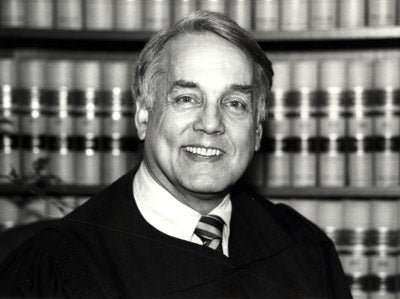 Justice Utter on the Washington Supreme
Court, 1992.
Justice Utter on the Washington Supreme
Court, 1992.
In the 1990s, Justice Utter taught a popular course on state constitutional law
at the University of Puget Sound School of Law. In 2002, he teamed up with his friend
Hugh D. Spitzer, a lawyer and University of Washington Law School professor, to
complete a book he had been working on for several years. The result was
The Washington State Constitution (Greenwood Press, ISBN 0-313-27464-9),
a definitive reference guide.
"One amazing thing about Bob," Spitzer says, "is that while he was on the State
Supreme Court, working with his colleagues, writing opinions and dealing with administrative
matters, he managed to put in the time and the intellectual rigor to write cutting-edge
law review articles on state constitutional law topics - lots of them, and all very
thoughtful and analytically deep. These pieces gained instant recognition nationally,
and for good reason."
Spitzer says Utter was also "a great tactician." Each case is assigned randomly
to a Washington Supreme Court justice, who then drafts an opinion. "When Utter was
assigned a case … he was a master at piecing together a majority. When necessary,
he would shift the issue in the case to avoid losing the right to compose that majority
opinion and to avoid seeing the law develop in a direction that he saw as being
harmful on a long-term basis. When he 'lost' a case and was in the dissent, he was
a master at reconfiguring and reinterpreting the majority opinion when he had the
opportunity … in a later opinion involving a related legal issue.
"It's also important to note that Bob Utter is one of those people who treats every
other human being with precisely the same high level of respect," Spitzer adds.
"His professional success and recognition never went to his head. He's obviously
comfortable enough with who he is that he doesn't have to bulk up his ego at the
expense of others. My late aunt was a social worker in the Juvenile Court 45 years
ago when Utter was a young Superior Court judge. She always told me what an incredibly
nice person he was to staff members and how much respect he showed to kids who appeared
before him. I discovered the same thing when I was a young lawyer/law teacher and
beginning research on the State Constitution."
Washington Supreme Court Justice Richard B. Sanders says Utter's "most important
intellectual achievement is that effort to popularize the State Constitution and
give it real meaning and application."
"When I went to law school at the UW in the 1960s," Sanders says, "there wasn't
even a class on state constitutional law. Then, in the 1980s, Justice Utter authored
an article for the UPS Law Review that served as a template on how to construe our
State Constitution. This is important work, because in terms of civil liberties
the Federal Constitution sets a floor for individual liberties, but not a ceiling.
This gives the states leeway to provide stronger protections."
Justice Charles W. Johnson agrees: "Utter's development of an independent interpretation
of the State Constitution was probably as strong an influence on this court as could
have been achieved by any individual. It was not a philosophy embraced by everyone
because it's not a comfortable philosophy. But the way Bob explained it in his writing
was persuasive. As lawyers and judges, we're most comfortable with the federal Constitution.
That's what we're taught in law school. We're not exposed to the State Constitution
if we're practicing law or judging at the lower court level.
Utter's development of an independent interpretation of the State Constitution was
probably as strong an influence on this court as could have been achieved by any
individual.
"Primarily," Johnson adds, "the issues revolve around the privacy provisions - search-and-seizure
jurisprudence under Article 1, Section 7, as compared to the 4th Amendment. The
language is entirely different, which is absolutely unique and that left us with
the challenge of determining 'Do these words have independent meaning?' Some said
'no' and some said 'yes,' and that was the debate. What Bob Utter did before I came
on the court was develop a language, or at least a foundation of the principles
that explained not only what these words meant to the drafters but how they should
be applied. And it made sense. … The door was not closed to the state constitutional
interpretation because Bob Utter had kept it open."
William L. Downing, a King County Superior Court judge who spent 11 years as a prosecutor,
was "aghast" at his earliest encounters with Justice Utter. "In the early 1980's,
I was a naïve young deputy prosecuting attorney and I wanted to know just who was
this State Supreme Court justice who thought he could overrule the United States
Supreme Court? The Supreme Court of Warren Burger was eagerly loosening the restrictions
that had been placed on police and prosecutors during the era of Chief Justice Earl
Warren, but some of the states were refusing to go along. Justice Utter seemed to
be gaily leading this revolutionary charge.
"Initially outraged, I took a closer look. What I found soon turned my head around.
First, I discovered there was nothing revolutionary afoot," Downing says. "The rules
being articulated by Bob Utter were entirely sensible ones for police, prosecutors
and trial judges to follow. In fact, if anything was radical, it was the sudden
federal cutbacks. I also found there was an undeniably principled basis for what
was being done. Justice Utter made sure that adherence to the State Constitution
as a protective layer for individual liberties was an intellectually honest approach,
with history and logic behind it. These discoveries turned me from a critic into
a staunch supporter of Justice Utter and our Washington Supreme Court."
Downing was to see another side of Utter in the early 1990s when as a parent and
a judge he became active in Youth & Government. "As a proud graduate of this
YMCA program, Utter's first-hand awareness of its value made him a passionate driving
force in spreading its reach. The young people of Washington today continue to be
enriched by his decades of contributions.
"Over the years, I have seen Bob Utter in many settings and he has graced them all.
His presence made the courtroom a more dignified and intellectually stimulating
place," Downing says. "I have observed him interacting with young people, including
my own son. His manner and his obvious interest have helped so many of them move
closer to realizing their potential. And, from a distance, I have looked on as he
has gone global with his always principled and always persuasive message."
A traveling man
"Going global" is putting it mildly. Utter was an active volunteer with international
judicial outreach programs during his later years on the high court, and when he
left the bench he seemed to be everywhere. The fall of 1991 found him lecturing
at a judges' academy in Moscow shortly after the failed coup against Boris Yeltsin's
progressive reforms. The Communist monolith that was the Soviet Union collapsed
just a few months later. "It was one of the most interesting times of my life,"
Utter says. "All was in flux about what form the post-Soviet world would take."
In 1992, the Dali Lama's legal adviser called Utter to get some advice on how to
draft the criminal law code for the Tibetan Government in Exile. Utter emphasized
dispute resolution and rehabilitation.
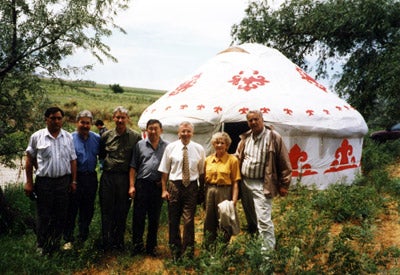 The Utters and other members of the
delegation outside a yurt in Kazakhstan in 1992. Made of felt, yurts are the traditional
nomadic dwelling of Kazakhstan.
The Utters and other members of the
delegation outside a yurt in Kazakhstan in 1992. Made of felt, yurts are the traditional
nomadic dwelling of Kazakhstan.
The Utters have made as many as five trips abroad in one year to promote the rule
of law and human rights in new and emerging democracies. As a volunteer with the
American Bar Association's Central European & Eurasian Law Initiative - "CEELI"
for short - Utter has shared his decades of judicial experience and knowledge of
constitutional law with judges from some 20 countries, including the former Soviet
states of Kazakhstan, Kyrgyzstan, Uzbekistan and assorted other "stans," which he
can pronounce like a native. He tells moving stories of brave men and women putting
their careers - sometimes their very lives - on the line in defense of an independent
judiciary. One formerly embattled judge told Utter that he had no choice but to
stand up to the KGB because "in a nation of slaves, the revolt of one slave is significant."
Betty Utter invariably ends up teaching English on these trips. There's not much
time for sightseeing. The Utters aren't disappointed. They say they've learned more
from people-to-people interaction in huts and village halls than on any tour bus.
Their prized souvenirs include humble but beautiful rugs, folk arts and crafts.
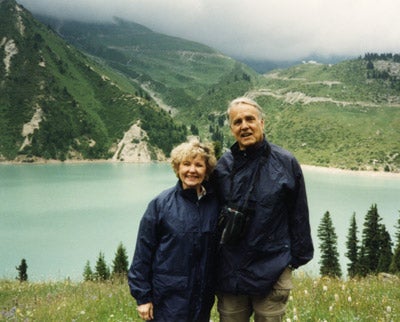 Betty and Bob Utter in the hills of
Kazakhstan.
Betty and Bob Utter in the hills of
Kazakhstan.
Bob has taught in Latvia, Serbia, Armenia, Moldova, Bulgaria, the Czech Republic
and both Outer and Inner Mongolia, where he led a People to People group in 1989,
a time when there had been few outside visitors. "We had an opportunity to see how
their ancient process of neighborhood councils for dispute resolution worked."
In Albania in the 1990s, he joined several other American judges and lawyers in
a series of seminars and lectures. The experience reminded them that even with its
myriad challenges justice American-style is a cakewalk. Albanian judges often were
without telephones. Pens, pencils and paper were in short supply. "The judges there
were peacekeepers - wise people in the neighborhood" who persevered despite having
"no ability to enforce decrees or access laws," Utter recalls. Still, the American
volunteers felt as if they were making real headway. Then the nation's chief justice
was ousted. The judges' association disintegrated. The American Bar Association
volunteers stayed in touch with their frightened Albanian colleagues as best they
could. In a report for the American Judicature Society in 2001, Scott Carlson, CEELI's
director, said their work paid major dividends for democracy. Power had changed
hands in 1998 and a new Albanian constitution was ratified. Capitalizing on his
prestige and experience, Utter was quickly back on the scene "to give moral and
intellectual support to the new chief justice, with whom he had worked during the
judiciary's darkest days."
"We run him ragged," Carlson said of Utter's frequent trips. "Every hour is booked,
with lectures, meetings and lunches."
Utter has made six trips to China and several to Prague, where the Law Initiative
has an institute. He taught civil rights law to Kosovo attorneys, served as dean
of the faculty for the program for Iraqi judges and headed the delegation to the
Czech Republic with the People to People Comparative Law Study group. He headed
another American Bar Association trip to Cuba. At the same time, he has volunteered
with the U.S. State Department and U.S. Agency for International Development.
For his work with judges in emerging democracies, Utter received the CEELI Volunteers
Award from the American Bar Association in 2003. Of all the awards he has received
over the years, this one touches him the most. "But my work is a small pebble compared
with what others do," Utter says with characteristic modesty. "It's been a great
privilege. The greatest has been to see the dedication of people around the world
under incredible circumstances working to develop the rule of law in their own countries."
He points to a poll taken in Haiti in 2001 to gauge people's priorities. "In a country
with massive unemployment, brutality, corruption, poverty and a pervading sense
of hopelessness," Utter wrote, "the primary wish was for the availability of justice
for all and for a non-corrupt court system. … The fulfillment of this universal
longing for justice and access to a fair judicial system does not occur without
an investment of time, energy, commitment and courage."
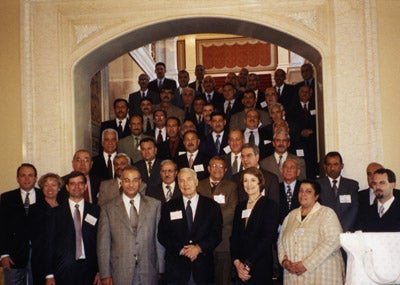 Justice Utter, front row, center, poses
with faculty members and some of the Iraqi judges who attended an educational seminar
in Prague in 2004.
Justice Utter, front row, center, poses
with faculty members and some of the Iraqi judges who attended an educational seminar
in Prague in 2004.
Utter says the 140 Iraqi judges who attended CEELI's "Judging in a New Democratic
Society" seminars in Prague in 2004 and 2005 were among the brightest and bravest
he has ever met - judicial profiles in courage. One was assassinated on the way
to the conference; another told of seeing two of his bodyguards killed while protecting
him from an attack. One of the most committed institute participants was the Secretary
of the Iraq Council of Judges. He was assassinated when leaving home for work in
2005. One judge told of spending 17 years in Iranian prisons following his capture
during the war between Iran and Iraq. He had been conscripted into the army. Finally
freed and reinstated to the bench, he found his home destroyed by a stray artillery
shell and members of his family dead.
One judge asked Utter if he planned to give them grades. "Why would I do that?"
Utter said. The Iraqi judge smiled and in a classic bit of black humor quipped that
he'd been thinking of getting an "F" so he could stay in Prague. "And who could
blame him?" Utter says. "They would all be returning to conditions little known
to most other jurists of this world." As dean of the faculty and a senior instructor
at the CEELI Institute, Utter was inspired daily by his students. One day, after
a presentation on American, European and other judicial ethics codes, the instructors
"challenged the Iraqi judges to draft their own code. Asked what element they would
add that was not in the other codes, they replied, 'Courage,' noting that without
courage all other ethical principles were of no value." We Americans too often think
we wrote the book on democracy, Utter notes.
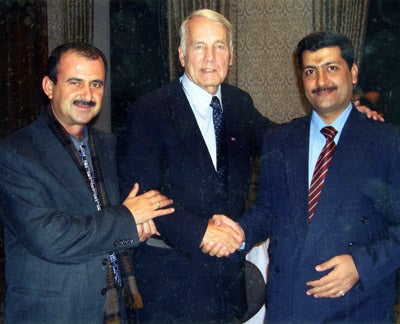 Utter with two Iraqi judges. Judge
Qais Hashem al-Shamari, right, was the Secretary of the Iraq Council of Judges.
He was assasinated in 2005.
Utter with two Iraqi judges. Judge
Qais Hashem al-Shamari, right, was the Secretary of the Iraq Council of Judges.
He was assasinated in 2005.
In the fall of 2008, Utter was part of a team that spent five weeks talking with
members of the United Nations' International Criminal Tribunal for Rwanda, where
in the space of three horrific months in 1994 three-quarters of a million people
were murdered - men, women and children hacked to death by machete-wielding soldiers;
fetuses ripped from wombs; unspeakable torture. One is tempted to suggest that some
Nazi death camps were humane by comparison. The Hutu extremists had set out to liquidate
the minority Tutsis and any moderate Hutus who dared protest. The members of the
war-crimes tribunal heard soul-searing testimony as they worked to bring ringleaders
to justice. Their work produced some landmark precedents in the annals of international
justice, notably establishing rape as genocide. During the reign of terror, women
were mutilated and murdered, destroyed "physically, mentally, emotionally." Sexual
violence was used to dehumanize, spread fear and disease.
The team that included Bob and Betty Utter, as well as former King County Superior
Court judge Donald Horowitz and former U.S. Attorney John McKay, now a law professor
at Seattle University, traveled to Tanzania and Rwanda to interview members of the
tribunal and survivors of the genocide. The oral histories and video interviews
became a compelling presentation called "Voices from the Rwanda Tribunal: Genocide
and Justice." The goal is to prevent another Rwanda by opening eyes and minds. If
the Nuremberg Trials of Nazi leaders had been followed by such a project, Utter
believes Cambodia's "killing fields," South Africa's poisonous apartheid regime
and the Rwandan atrocities might have been avoidable. At the very least, the world
would have been farther down the road to international justice.
The mediator
In 1997, after a mentally ill man fatally stabbed a retired Kent firefighter outside
the Kingdome in a random act of madness, King County Executive Ron Sims named Utter
to head a special task force to investigate how the mental health system deals with
misdemeanor offenders. The attacker earlier had been sent to Western State Hospital
for psychiatric examination after stealing a bicycle. It wasn't the first time he'd
been in trouble, and he assaulted two state employees during his confinement. Nevertheless,
he was sent back to the County Jail and eventually released with no further treatment.
"I can't think of anyone better than Justice Utter" to head the task force, said
Sims. "He brings his integrity, his sense of justice and his sense of humanity to
this important task" and "is ideally suited to finding out how we fix the system."
The result, in 1999, was the formation of a now nationally recognized therapeutic
court that strives to promote cooperation between mental health treatment providers
and the criminal justice system, two systems that usually have not been close allies.
The Mental Health Court, one of the first in America, celebrated its 10th anniversary
in February of 2009. "The work of this court for the past decade is a testament
to how collaborations like this can reduce incarceration costs while also improving
lives and protecting public safety," said Judge Barbara Linde, presiding judge of
the King County District Court.
In 1998, Utter became the fledgling Washington News Council's first chairman and
stayed with it for six years. The independent, nonprofit group strives to promote
accurate and balanced news media coverage. Utter "did a superb job, as you might
expect, presiding over our hearings with absolute even-handedness," says the council's
executive director, John Hamer.
"Hamer's invitation to Bob to preside over the first hearings of the News Council
was a stroke of genius," says Cliff Rowe, a communications professor at Pacific
Lutheran University who served on the council for several years. "I had long admired
Justice Utter as an articulate voice for press freedom, and his willingness to accept
the chairmanship immediately put a recognizable face of fairness and dignity on
the hearings. He was always calm, patient and unruffled, which gave the council
even more credibility."
"Don't label me"
Having left the bench, Utter has been free to pursue political activism. Like most
Washingtonians, he bristles at the notion of defacto party "registration." Described
even recently as a "lifelong Republican," he is in truth a freelancer. He admires
Dan Evans, the "mainstream" Republican who appointed him to the high court, as well
as Booth Gardner and Gov. Chris Gregoire, both Democrats. Secretary of State Sam
Reed and Attorney General Rob McKenna, both Republicans, are "bright and principled"
in his view. He admires former GOP Secretary of State Ralph Munro, who shares his
concern for the handicapped and underprivileged. Utter also praises John Spellman,
the one-term Republican governor "who made a lot of tough calls during another time
of fiscal hardship." His judicial heroes include the legendary Supreme Court Justice
William O. Douglas, another freethinker, who loved the outdoors and grew up in Yakima.
Utter voted for Bill Clinton twice. He jumped ship in 1998 out of disgust over the
president's sexual escapades with an intern. He urged Clinton to resign. The letter
was vintage Utter, combining his knowledge of history with the perspective of someone
who fervently believes in rehabilitation and redemption: "I can sense the anguish
you have, personally, for your fine family, for your staff and supporters, and for
the people of this country whom you misled for the past seven months," Utter told
the president. "As a student of history, I am certain you are familiar with the
Profumo affair that rocked Great Britain decades ago." Secretary of State for War
John Profumo's "offense was similar to yours in the sense that he misled the people
of his country and the Parliament he served about a sexual indiscretion. His chosen
path of redemption was resignation followed by a life of service to those most in
need. While his conduct was damaging to his party and nation, his place in history
is secure as a man who recognized his misconduct, dealt with it with honor and found
admiration of his fellow countrymen by his subsequent conduct. …
"On the evidence so far, I do not believe you have committed an impeachable offense,"
Utter added. "Nonetheless, that is not the real issue. The real issue is what damage
will be done to this country by making your inexplicable conduct the focus of national
and international attention at a time when our focus must be directed to more serious
affairs, both domestic and foreign. … Even if you avoid impeachment, you will cripple
the Democratic Party …"
No reply was received. "I thought about writing another one saying, 'And I mean
it!'" Utter says with a laugh.
In 2004, the Utters contributed $1,000 to retired general Wesley Clark, the Rhodes
Scholar who sought the Democratic presidential nomination. In 2008, they donated
$1,100 to the Obama campaign. Utter was eager for a change of philosophy in the
White House. He views George W. Bush "as the best example of the Peter Principle."
Bush "will go down in history as a man of perhaps good intentions but one who almost
destroyed the fabric of our country," Utter says. "The Iraq war was a tragic blunder;
the fiscal policies were foolhardy; the judicial appointments - while superb in
our state - often were not the best possible people, and he displayed no fundamental
belief in the rule of law. Rather than focusing on what was best for the country
he focused on what was best for partisan politics, to our great loss."
In the summer of 2008, Washington's gubernatorial race was shaping up to be a re-run
of the 2004 photo-finish that saw Gregoire defeat Dino Rossi by 133 votes. Utter
and Faith Ireland, another former Supreme Court justice, announced they were heading
a coalition threatening to file suit against the Building Industry Association of
Washington and its King and Snohomish County affiliates. The allegation was that
the builders were illegally raising and spending money to boost the Rossi campaign,
ducking public disclosure laws. Utter also worried that the builders would use the
war chest to back a candidate in a race for the Supreme Court, as they had in 2006
when Chief Justice Gerry Alexander was targeted as being a left-of-center "activist"
judge. It was a nasty campaign.
"I believe the actions of the BIAW violate the letter and spirit of the public disclosure
law in this campaign season and in past seasons as well," Utter told reporters.
"The law provides for a process to test these concerns. I look forward to a successful
determination of the issues."
He and Ireland wrote an op-ed piece for the Seattle Post-Intelligencer, asserting
that "Special interests are increasingly supporting candidates through 'independent
expenditures' that are not subject to contribution limits. These 'independent' campaigns
also tend to contain the most vicious and dubious negative attacks, since the benefitting
candidates can say they have no control over the messages." Their lawsuit was officially
filed in October, and Attorney General McKenna also brought legal actions against
two builders' groups for late reporting of political contributions.
Voters need to be able to judge whether a candidate might be beholden to one special interest or another...
"Buildergate" was a red herring, Rossi emphasized, just "more flailing from a desperate
campaign and its allies." The Republican from King County flatly denied the charges
and said that forcing him into court to testify under oath about allegations that
he illegally coordinated his campaign fundraising with the builders was a ploy to
smear him and deny him important time on the campaign trail as the race was heading
down the stretch. The Rossi campaign noted that Utter and Ireland had made monetary
donations to Gregoire's campaign. The ex-judges said they had done so in compliance
with the law and with full transparency.
This time, Gregoire comfortably won re-election in the Obama landslide, and at this
writing in the spring of 2009 the lawsuits are unresolved. Utter says the issue
won't go away. "Voters need to be able to judge whether a candidate might be beholden
to one special interest or another," he says. "It's a bipartisan issue. The public
disclosure laws are there for a purpose and to be followed, not subject to game
playing and hide the ball."
Conflicts of interest
In March of 2009, Utter teamed up with his friend Charlie Wiggins, a former Court
of Appeals judge, for another op-ed, this one in The Seattle Times. It emphasized
that judges should not hear cases involving contributors to their campaigns. This
might sound like a self-evident truth, but it happened in West Virginia - big time.
The U.S. Supreme Court was weighing a case in which a judge who was funneled $3
million in campaign contributions from the CEO of a coal company refused to withdraw
from hearing a case involving a lawsuit against the coal company. The judge then
provided a crucial vote in a 3-2 ruling to overturn a $50 million jury verdict against
the company.
"Eight hundred years ago," Utter and Wiggins wrote, "King John promised the English
barons in the Magna Carta, 'To none will we sell; to none will we deny; to none
will we delay right or justice.' This promise of absolute impartiality has become
the bedrock of the American system of justice. Studies have shown that three out
of four Americans believe that election contributions affect judges' decisions.
… The Goddess of Justice is always portrayed as blind, emphasizing her complete
impartiality.
The Goddess of Justice is always portrayed as blind, emphasizing her complete impartiality.
"Could this problem occur in Washington State? Unfortunately, yes," Utter and Wiggins
said. "Spending for Washington Supreme Court elections has skyrocketed in recent
years. … A proposed Washington state court rule now under consideration would require
a judge to step down from a case if a party provided the judge with substantial
campaign support. … Justice must appear to be fair as well as actually being fair."
Stay of execution
On March 12, 2009, the day before the state was poised to carry out its first execution
in eight years, The Seattle Times featured a column by Utter, who argued that "Retaining
the death penalty fails to serve either justice, public safety or the public purse."
"Since my resignation from the Washington State Supreme Court in 1995 to protest
the death penalty, many things have changed," Utter wrote. "Public support for the
death penalty has fallen dramatically over the past 14 years. Since 1995, death
sentences in America have declined more than 60 percent, reversing a generation-long
trend toward greater acceptance of capital punishment.
"Most Americans continue to support the death penalty for the truly guilty. However,
the discovery of innocence in more than 130 cases where people have been sentenced
to death, exonerated and released is one more reason to question the need for retention
of the death penalty. DNA testing is a partial answer, but even that is available
in less than 10 percent of all homicides and is no guarantee we will not execute
innocent people.
"As for punishment and protection, life in prison without the possibility of parole
is available in 48 states, including Washington, and prevents criminals from reoffending.
It means what it says — 23 of 24 hours a day locked in a tiny cell is not coddling.
Traditional objections — such as cost, delay and questionable deterrence, given
uncertainty and randomness of application — still exist. As does rejection of the
death penalty by most civilized societies, including more than 50 members of the
Council of Europe. …
"In addition, many states are now examining the question of cost and have pointed
out that capital cases cost three times as much as homicide cases in which the death
penalty is not sought. They have done this reasoning that there are better and cheaper
ways to reduce crime."
Later that day, the Washington Supreme Court voted 5-4 to issue a stay of execution
pending proceedings in Thurston County Superior Court on a challenge to the constitutionality
of lethal injection.
"On any stage"
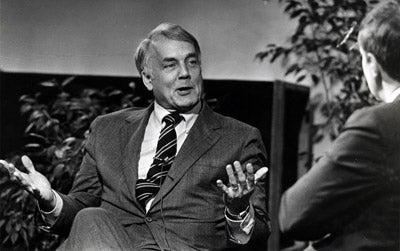 Justice Utter talks with the Rev. Brad
Gill at Christian Cable Ministeries in Aberdeen in 1991 about his trips to the Soviet
Union. Kathy Quigg for The Daily World, Aberdeen.
Justice Utter talks with the Rev. Brad
Gill at Christian Cable Ministeries in Aberdeen in 1991 about his trips to the Soviet
Union. Kathy Quigg for The Daily World, Aberdeen.
How to sum up Robert F. Utter's legacy? "Utter always seemed to be the judge's judge,"
Justice Sanders says. "Ultimately, he resigned because of his abhorrence of the
death penalty. That's the kind of justice we need - someone who really cares about
this stuff. Now, in retirement, he's been all over the world promoting a vigorous
independent judiciary. It's a privilege to sit in the same chair where he once sat."
Judge Downing says, "On any stage - in the courtroom, the classroom or a foreign
capital - Bob Utter's generosity of spirit and his ability to inspire have blessed
all those with the good fortune to be near him. When he left the bench, he took
his penchant for education on the road. His wise head and his warm heart - both
committed to the concept of liberty under the rule of law - became traveling ambassadors
for an independent judiciary. The world became his classroom. He is a truly remarkable
man."
Justice Charles W. Johnson, who shares Utter's "passion for being on the water,"
believes his fellow sailor "has left in his wake" a remarkable legacy. In their
four years together on the high court, "He became a mentor to me and a friend. But
he was also teaching at the law school and reaching out in so many ways to so many
people, not just in this state but across the country and around the world. During
your life you run across many people," Johnson says. "Some of them make a mark in
a way that looking back you can say, 'By having known this person I am a better
person.' And that's the way I feel about Bob Utter. He has the ability to listen
and care. At the end of my journey, I would like to have accomplished half of what
he has accomplished."
* * *
A footnote: Donald Delano Wright, the Seattle Times reporter who
spotlighted the inequities in the death penalty, went on to serve on the Seattle
City Council. He died in 2007 at 72. A man of "innate goodness," he never stopped
advocating against the death penalty and donated profits from To Die is Not Enough
to good causes, including trust funds for the families of murder victims. The book
was published by Houghton Mifflin Co. Boston, 1974; ISBN 0-395-18478-9.